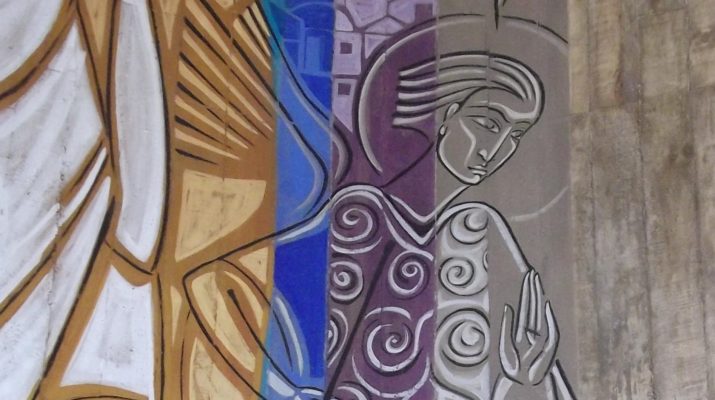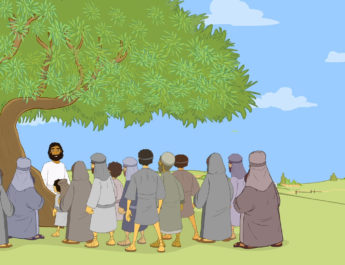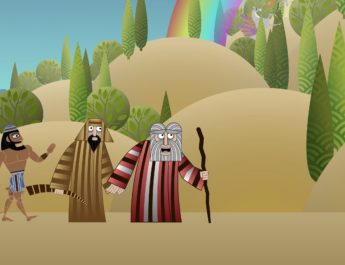Psalm 91
1 You who liveA in the shelterB of the Most High,C
A “live” = yashab. This is to sit and so to remain and so to dwell. It is sitting for any reason – as a judge, in order to ambush, or just sitting quietly. Causatively, this can mean settling or marrying. This can also mean continue, endure, or establish.
B “shelter” = sether. From sathar (hide, conceal, or be absent; hiding because something is covered – used in a literal or figurative sense). This is covering, shelter, protection, hiding place. It can be hidden by a mountain, by clouds, in the womb, in a matter of secrecy, through slander, or of nations.
C “Most High” = Elyon. From alah (to go up, ascend, be high, be a priority; to arise in a literal or figurative sense). This is most high, upper. It refers to elevation – so, lofty.
who abideD in the shadowE of the Almighty,F
D “abide” = lun. This is to stop – usually to lodge for the night. It can imply dwelling, enduring, or staying permanently. Figuratively, it can mean being obstinate, particularly with one’s words – to complain.
E “shadow” = tsel. From tsalal (to be or become dark, shade; this is the shade as during twilight or shadow as associated with something opaque). This is shade in a literal or figurative sense. So, it could be shadow, shade, protection, shelter, or defense.
F “Almighty” = Shaddai. Perhaps from shadad (to ruin, assault, devastate, oppress, destroy completely; properly, it is being burly; figuratively it is something that is powerful) OR from shed (protective spirit) OR shadah (to moisten) OR shad (breast). Perhaps meaning almighty, “my destroyer,” “my protective spirit,” “my rainmaker,” “self-sufficient, “who is abundantly,” or “breasted one” – as the one who abundantly provides or grants fertility/abundance to humans. See https://www.abarim-publications.com/Meaning/Shaddai.html#.Xxi6Ep5KhPY
2 will say to the Lord,G “My refugeH and my fortress;I
my God,J in whom I trust.”K
G “Lord” = YHVH. From havah (to be, become) or hayah (to come to pass, become, be). This is the name of the God of Israel, the self-existent and eternal one, the tetragrammaton. This pronunciation has been lost to time so “Lord” is generally used in its place.
H “refuge” = machaseh. From chasah (to take refuge or flee for protection; figuratively, to hope or trust in someone or something). This is a shelter in a literal or figurative sense. It is refuge or place of refuge. It could also be hope or trust.
I “fortress” = matsud. From matsod (bulwark, siege works, net, snare); from tsud (to hunt, to lie in wait in order to catch an animal; used figuratively for capturing people). This is a castle, fortress, or stronghold. Also, a snare, net, or prey. It can abstractly mean capture.
J “God” = Elohim.
K “trust” = batach. This is to hide for refuge, be secure or sure. Figuratively, it refers to trust, being confident, or hoping.
3 For he will deliverL you from the snareM of the fowlerN
and from the deadlyO pestilence;P
L “deliver” = natsal. This is to snatch someone or something away in a good sense – as rescue, defend, or deliver – or in a bad sense – as strip or plunder.
M “snare” = pach. From pachach (to trap, lay a net). This is a snare or bird trap. It can also refer to a sheet of metal hammered into a thin plate.
N “fowler” = yaqush. 3x in OT. From yaqosh (to set a snare in a literal or figurative sense; a fowler). This is entangled. It can be used for a fowler or trapper.
O “deadly” = havvah. Related to “Lord” in v2. 15x in OT. From havah (see note G above). This is a chasm, emptiness, or deep pit. It can be destruction or calamity. It can also be greed, craving, or mischief. It implies falling and ruin.
P “pestilence” = deber. From dabar (to speak, declare, discuss, destroy, subdue). This is plague or thorns.
4 he will coverQ you with his pinions,R
and under his wingsS you will find refuge;T
his faithfulnessU is a shieldV and buckler.W
Q “cover” = sakak. This is to cover or overshadow. It could also be to hedge or fence it. Figuratively, this could be to defend, protect, or join together.
R “pinions” = ebrah. 4x in OT. From eber (wing, pinion); from abar (to fly, soar). This is a feather or wing.
S “wings” = kanaph. This is wing, edge, corner, extremity. It can also be a flap or fold of a garment or the pinnacle of a building.
T “find refuge” = chasah. Related to “refuge” in v2. See note H above.
U “faithfulness” = emet. From aman (to believe, endure, fulfill, confirm, support, be faithful, put one’s trust in, be steadfast. Figuratively, this is to be firm, steadfast, or faithful, trusting, believing, being permanent, morally solid). This is firmness or stability. Figuratively, it is faithfulness, truth, or trustworthiness. This is the same root that “amen” comes from.
V “shield” = tsinnah. From tsen (root may mean to be prickly; thorn, barb, cactus hedge). This is a hook or barb. It can also be a buckler, shield, target. Figuratively, it can refer to piercing cold.
W “buckler” = socherah. 1x in OT. From sachar (to travel, go around; to travel like a peddler, to trade, to be a merchant, to palpitate.). This is a buckler or shield that surrounds someone.
5 You will not fearX the terrorY of the night,Z
or the arrowAA that fliesBB by day,CC
X “fear” = yare. This is to fear, be afraid, dreadful. It can also refer to fearful reverence – to fear in a moral sense is to say to revere, respect.
Y “terror” = pachad. From pachad (to dread, be afraid, thrill, be in awe; feeling startled from a sudden sound or alarm). This is dread, fear, awe, panic. It can also refer to what someone fears or dreads.
Z “night” = layil. Properly, this refers to light twisting away. It is used for night or midnight. Figuratively, this can mean adversity.
AA “arrow” = chets. From chatsats (to divide, chop, pierce, distribute, shoot an arrow, an archer). This is an arrow or archer, shaft, staff. Properly, it is someone or something that pierces, such as an arrow. It can imply a wound. Used figuratively of God’s thunder bolt.
BB “flies” = uph. This is to fly, flee, be weary. It can also mean to cloak with wings or darkness.
CC “by day” = yomam. From yom (day, age, daily, each, today). Root may mean to be hot. So, this is day as the hours that are hot. This can be daytime in a literal or figurative sense.
6 or the pestilence that stalksDD in darkness,EE
or the destructionFF that wastesGG at noonday.HH
DD “stalks” = halak. This is go, come, walk. It is walk literally and figuratively and includes people and animals. It can be used figuratively for one’s moral life – how we walk according to God’s way or against it. It can also refer to the walk of life as in the course one’s life takes, the choices we make, etc.
EE “darkness” = ophel. 9x in OT. Perhaps from the same as aphel (gloomy – unused root which refers to the sun setting i.e. dusky, dark). This is darkness, gloom, dusk, obscurity.
FF “destruction” = qeteb. 3x in OT. May come from a word that means to cut off. This is sting, pestilence, ruin, or destruction.
GG “wastes” = shud. Perhaps related to “Almighty” in v1. 1x in OT. Perhaps related to shadad (see note F above). This is to swell up, devastate.
HH “noonday” = tsohar. From tsahar (pressing oil, glistening); from yitshar (fresh oil, anointed; oil as that which is burned to make light; used figuratively to talk about anointing). This is a light, window, or midday.
7 A thousandII may fallJJ at your side,KK
II “thousand” = eleph. Perhaps from the same as eleph (herd, cattle); from alaph (to learn, speak, associate with). This is thousand.
JJ “fall” = naphal. This is to fall, whether by accident, to fall prostrate, or to fall in violent death. Figuratively, it can refer to personal ruin or calamity, a city falling, an attack or a falling away. It can also be a deep sleep or wasting away.
KK “side” = tsad. Root may mean to sidle. This is a side or an arm. It can also be used to mean beside or, figuratively, an adversary.
ten thousandLL at your right hand,MM
but it will not comeNN near you.
LL “ten thousand” = rebabah. 16x in OT. From rabab (being many or much, abounding, increasing, multiplying; cast together and so the sense of increasing, generally in number). This is abundance, a myriad. It can be an indefinite large amount or mean ten thousand or a million.
MM “right hand” = yamin. May be from yamam (to go or choose the right, use the right hand; to be physically fit or firm). This can mean right hand, right side, or south. Since most people are right-handed, the metaphorical usage of this word presumes that the right hand is stronger and more agile. Thus, it is the instrument of power and action.
NN “come” = nagash. This is to draw, bring, or come near. It is approaching for any reason – as an attack on an enemy, in order to worship, to make an argument. It can also be used as a euphemism for sex.
8 You will onlyOO lookPP with your eyesQQ
and seeRR the punishmentSS of the wicked.TT
OO “only” = raq. From the same as raq (thin, surely, only); perhaps from raqaq (to spit). This is but, except, at least. In the sense of being thin, it figuratively refers to some kind of limit.
PP “look” = nabat. This is to behold, look at intently, consider, or scan. It can mean to have respect or regard someone favorably.
QQ “eyes” = ayin. This is eye in a literal or figurative sense so eye, appearance, favor, or a fountain (the eye of the landscape).
RR “see” = raah. This is to see in a literal or figurative sense so stare, advise, think, view.
SS “punishment” = shillumah. 1x in OT. From shalam (to be complete or sound; to have safety mentally, physically, or extending to one’s estate; so, if these things are safe and complete, the implication is that one would be friendly; and, if being friendly, one would make amends and that friendship would be reciprocated). This is retribution or recompense.
TT “wicked” = rasha. This is morally wrong so it refers to someone who is actively bad as wicked, criminal, an evil person, offender, condemned, or ungodly.
9 Because you have madeUU the Lord your refuge,
the Most High your dwelling place,VV
10 no evilWW shall befallXX you,
no scourgeYY come nearZZ your tent.AAA
UU “made” = sim. This is to put or place in a literal or figurative sense. It can be appoint, care, change, make, and may other things.
VV “dwelling place” = maon. 17x in OT. From anah (to answer, respond, announce, sing, shout, or testify; to pay attention, which implies responding and, by extension, starting to talk; singing, shouting, testifying, etc.) OR from the same as onah (marriage, living together, marital duty). This is dwelling, den, haunt, retreat. It can refer to the Tabernacle or Temple. It can also be used for homes or animal lairs.
WW “evil” = ra’. From ra’a’ (to be evil, bad, afflict; properly, to spoil – to destroy by breaking into pieces; figuratively, to cause something to be worthless; this is bad in a physical, social, or moral sense; that which displeases, to do harm or mischief, to punish or vex). This is bad, disagreeable, that which causes pain, misery, something having little or no value, something that is ethically bad, wicked, injury, calamity. This refers to anything that is not what it ought to be – a natural disaster, a disfigurement, an injury, a sin.
XX “befall” = anah. 6x in OT. This is to meet, happen, approach.
YY “scourge” = nega. From naga (touch, reach, arrive, come near, strike; touching for any reason including sexual or violent). This is a blow or stroke, wound, sore, mark plague. It can refer to someone with leprosy or to dress.
ZZ “come near” = qarab. This is to come near, offer, make ready, approach, take.
AAA “tent” = ohel. Perhaps from ahal (to shine, be clear). This is a tent, covering, home, or side pillar.
11 For he will commandBBB his angelsCCC concerning you
to guardDDD you in allEEE your ways.FFF
BBB “command” = tsavah. This is to charge, command, order, appoint, or enjoin. This is the root that the Hebrew word for “commandment” comes from (mitsvah).
CCC “angels” = malak. This is a messenger, an angel, or a deputy of some kind. Can be used for human messengers literally or for prophets, priests, or teachers as messengers of God. Also used for supernatural messengers i.e. angels.
DDD “guard” = shamar. This is to keep, watch, or preserve. It means to guard something or to protect it as a thorny hedge protects something.
EEE “all” = kol. From kalal (to complete). This is all or every.
FFF “ways” = derek. From darak (to tread, march, to walk. Can also mean affixing a string to a box since one needs to step on it to bend it in the process; so also an archer). This is a road as a thing that is walked on. Can be used figuratively for the path that one’s life takes or how one chooses to live one’s life.
12 On their handsGGG they will bear you up,HHH
so that you will notIII dashJJJ your footKKK against a stone.LLL
GGG “hands” = kaph. From kaphaph (to bend – from a root meaning curve or bend down). This is palm of the hand or sole of the foot, footstep, grasp. Figuratively, it can also mean power.
HHH “bear…up” = nasa. This is to lift in a broad sense, literally and figuratively. So it could be to carry, take, or arise. It could also be bring forth, advance, accept.
III “so that…not” = pen. Perhaps from panah (to turn, face, appear). This is lest, if, or.
JJJ “dash” = nagaph. This is to strike, beat, hurt, stumble, defeat, inflict disease.
KKK “foot” = regel. This is foot, endurance, or journey. It is a foot as the means of walking and so it implies a step or a greater journey. It can be used euphemistically for private parts.
LLL “stone” = eben. This is a stone, weight, or mason. It is part of the word “Ebenezer.”
13 You will treadMMM on the lionNNN and the adder,OOO
the young lionPPP and the serpentQQQ you will trample under foot.RRR
MMM “tread” = darak. Related to “ways” in v11. See note FFF above.
NNN “lion” = shachal. 7x in OT– 3x in Job, 1x in Psalms, 1x in Proverbs, & 2x n Hosea. May come from a word meaning roar. This is a lion as roaring and fierce.
OOO “adder” = pethen. 6x in OT. This is some kind of venomous snake. Its root may mean to twist. Perhaps it is a cobra, asp, or adder.
PPP “young lion” = kephir. Perhaps from kaphar (to appease, cover, pacify, cancel). This is a young lion – maybe in the sense that it has a mane covering.
QQQ “serpent” = tannin. From the same as tan (jackal, dragon, whale). It may stem from a root meaning elongate. It is some kind of monster of land or sea like a jackal or a sea serpent.
RRR “trample under foot” = ramas. 19x in OT. This is to trample or tread down. It could be to work as a potter, to walk, or to be abusive.
14 Those who loveSSS me, I will deliver;TTT
I will protectUUU those who knowVVV my name.WWW
SSS “love” = chashaq. 11x in OT. This is to cling, have a desire, love, join, deliver.
TTT “deliver” = palat. This is to escape, slip out, deliver, carry away, or calve.
UUU “protect” = sagab. This is to raise, lifted, high, set secure on high, excellent, or strong. It is inaccessibly high in a literal and figurative sense. It implies something that is safe and, therefore, something that is strong.
VVV “know” = yada. This is to know, acknowledge, advise, answer, be aware, be acquainted with. Properly, this is to figure something out by seeing. It includes ideas of observation, recognition, and care about something. It can be used causatively for instruction, designation, and punishment.
WWW “name” = shem. Related to “made” in v9. May be from sim (see note UU above). This is name, fame, renown. A name was thought to indicate something essential about a person – something about their individuality. So, this word can also mean honor, authority, or character.
15 When they callXXX to me, I will answerYYY them;
I will be with them in trouble,ZZZ
I will rescueAAAA them and honorBBBB them.
XXX “call” = qara. This is to call or call out – to call someone by name. Also used more broadly for calling forth.
YYY “answer” = anah. Related to “dwelling place” in v9. See note VV above.
ZZZ “trouble” = tsarah. From tsar (properly, a narrow or constricted place; figuratively, trouble, a pebble, an enemy, anguish, or distress); from tsarar (to bind, restrict, narrow, be cramped, an adversary). This is tightness, distress, affliction, trouble, or adversary.
AAAA “rescue” = chalats. This is to turn back or away in a literal or figurative sense. So, it could be return, break, build, retreat. It doesn’t necessarily imply going back to the place you started.
BBBB “honor” = kabad. To be heavy, weighty, or severe. It can also be positive abounding in, rich, or honorable. The Hebrew word for “glory,” kabod, is taken from this root.
16 With long lifeCCCC I will satisfyDDDD them,
and showEEEE them my salvation.FFFF
CCCC “long life” = orek + yom. Literally “length of days.” Orek is from arak (to be long in a literal or figurative sense, to continue, defer, draw out). This is length, long, or forever. Yom is related to “by day” in v5. See note CC above.
DDDD “satisfy” = saba. To be satisfied or full in a literal or figurative sense. Also, to have plenty of.
EEEE “show” = raah. Same as “see” in v8. See note RR above.
FFFF “salvation” = yeshuah. From yasha (to deliver, defend, help, preserve, rescue, be safe. Properly, to be open, wide or free, which implies being safe. Used causatively, it means to free). This is salvation, deliverance, health, victory, prosperity.
Image credit: Virgin’s Monastery, Petrópolis, Rio de Janeiro State, Brazil by Claudio Pastro.




